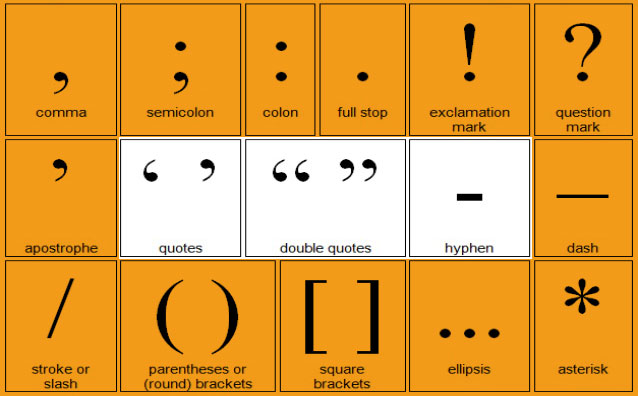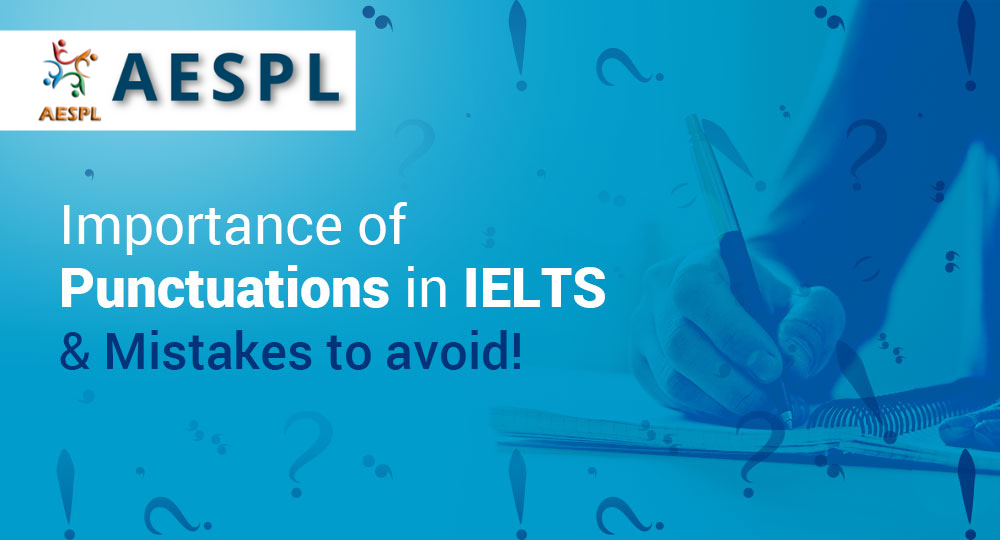Marilyn Thomas finds happiness in cooking her family and her dog
Sounds disturbing, right?
The use of punctuation is extremely pertinent in the English language. It might seem to some as pointless or complicated but it gives the sentence the right meaning to understand it properly. Lack of use of punctuations or improper placement of punctuations can change the entire meaning of the sentence!
When you read, “Marilyn Thomas finds happiness in cooking, her family, and her dog.”, this offers you the actual meaning which the writer intended to be read.
Writing provides a mode of communication with others by sharing your personal thoughts, opinions and creativity. So, when there is any incorrect sentence structure, or any mistakes in grammar, spelling or punctuation, it can and will change the meaning of the message that is to be conveyed. In other words, you can say that, Punctuation holds a lot of power!
Similarly, in IELTS, Punctuation matters very much. The lack of use of punctuations can throw off the evaluator from giving you the needed score. So, for the IELTS Test Preparation, the following will give you a thorough idea to avoid any grammatical mistakes.

The Different Types and Proper Use of Punctuations:
1. The use of Capital letters (A, B, C) and Full stops(.):
The beginning of the sentence should always start with a capital letter and end with a full stop. The use of a full stop should be made between sentences to let the Evaluator know where the sentence starts and ends.
Any proper nouns (a person’s name, places, nationalities, languages) should start with a capital letter.
For e.g. Delhi is the capital of India.
2. Commas (,):
The primary use of a comma is the intention of a pause between sentences. It is used to separate parts of sentences to avoid any confusion in the meaning.
For e.g. She is an intelligent, beautiful, young woman.
3. Semicolon (;):
This punctuation is a little trickier for people to use. A semicolon is used when a sentence is complete, yet needs extra information in it.
For e.g. the manager was loved by all his staff; many employees quit their job when he was fired.
4. Colon (:):
Generally, a colon is used to draw the attention of the reader to what is to follow- an explanation or a list.
For e.g. You may be required to bring many things:
- sleeping bags
- pans, utensils and
- warm clothing.
5. Apostrophe (‘):
An apostrophe has two different, unrelated meanings:
- To indicate possession: This means something belongs to someone/thing. You can either use ‘s or s’, depending on the noun is singular or plural
For e.g. Jonah’s painting is a spectacular one.
The headmaster took away the students’ ball.
6. Exclamation Mark (!):
People commonly overuse this punctuation. It is mainly used at the end of a sentence to emphasize the emotions of the writer. However, an exclamation mark should NEVER be used in formal writing.
For e.g. Tom, Look out!
What a mess!
7. Question Mark (?):
A question mark at the end of a sentence is used to ask a question. (Don’t use a question mark in formal writing)
For e.g. Why does light travel faster than sound?
Well, these are some of the punctuation marks that you should take care of while writing in the IELTS exam.
However, there are some Common punctuation mistakes made during IELTS:
Lack of Full Stops:
When you don’t end a sentence, the examiner will not come to know where the sentence begins and where does it end. Due to this, the meaning of the text will change and affect your score because of lack of cohesion and coherence of the text.
Improper Use of Commas:
Sometimes people don’t end sentences instead they keep on going by using commas multiple times in a single sentence. If your text contains 3-4 sentences without a full stop, realize that something is wrong with the text.
Exclamation Mark in Formal Writing:
While writing a formal piece, many test-takers will commit the mistake of emphasising emotions. It should only be used in informal writing to portray shock, anger, happiness, disgust or danger.
False Use of it’s to Show Possession:
The apostrophe it’s is only here as a contraction of it is, or it has.
Hope you understand these essential keys while prepping for the IELTS Exam. But to be very sure that you’re not making any mistake, it is advisable to seek help from the expert professionals at IELTS Tutorials. They will yield in-depth guidance, tips and strategies for IELTS Grammar for Writing, to avoid any grammatical mistakes and score better.
So, avoid any kind of IELTS Grammar Mistakes and avail the best online coaching– Group coaching or Personalised coaching only at IELTS Tutorials. Grab the best deals today at IELTS Tutorials for a huge discounted price.


More Stories
Site Oficial Para Cassino Online At The Apostas No Brasil
Site Oficial Para Cassino Online At The Apostas No Brasil
“Logon Mostbet Guia